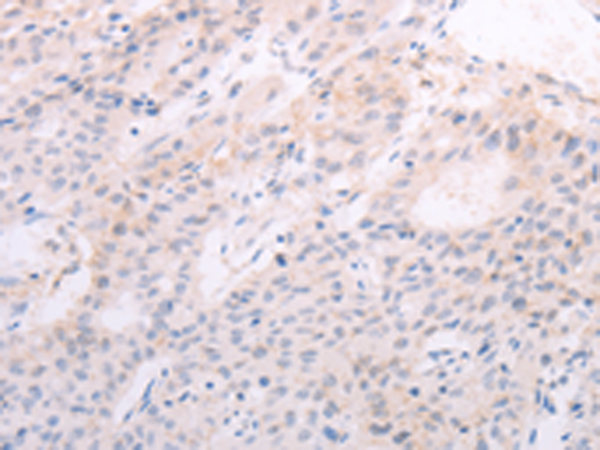
| WB | 咨询技术 | Human,Mouse,Rat |
| IF | 咨询技术 | Human,Mouse,Rat |
| IHC | 1/25-1/100 | Human,Mouse,Rat |
| ICC | 技术咨询 | Human,Mouse,Rat |
| FCM | 咨询技术 | Human,Mouse,Rat |
| Elisa | 1/2000-1/5000 | Human,Mouse,Rat |
| Aliases | LGR3; CHNG1; hTSHR-I |
| Host/Isotype | Rabbit IgG |
| Antibody Type | Primary antibody |
| Storage | Store at 4°C short term. Aliquot and store at -20°C long term. Avoid freeze/thaw cycles. |
| Species Reactivity | Human |
| Immunogen | Fusion protein of human TSHR |
| Formulation | Purified antibody in PBS with 0.05% sodium azide and 50% glycerol. |
+ +
以下是关于TSHR抗体的3篇参考文献及其摘要概括:
1. **文献名称**:*The Thyroid Stimulating Hormone Receptor in Graves' Disease*
**作者**:Smith, B.R., Rees Smith, B.
**摘要**:该研究首次确认了Graves病中TSHR自身抗体的存在及其致病机制,揭示了其通过激活受体导致甲状腺功能亢进的作用。
2. **文献名称**:*TSH Receptor Autoantibodies: Pathogenesis and Clinical Relevance in Graves' Disease*
**作者**:Rapoport, B., Chazenbalk, G.D., McLachlan, S.M.
**摘要**:文章系统分析了TSHR抗体的多态性,探讨不同亚型(刺激性/阻断性抗体)如何影响Graves病和甲状腺功能减退症的临床表现。
3. **文献名称**:*Clinical Utility of TSH Receptor Antibodies Measurement in Thyroid Diseases*
**作者**:McLachlan, S.M., Rapoport, B.
**摘要**:综述了TSHR抗体检测在诊断和预后评估中的应用,强调其在Graves病疗效监测和妊娠期甲状腺功能异常管理中的价值。
如需更具体的研究内容或近年文献,建议通过PubMed或Google Scholar检索关键词“TSHR antibody”+“Graves”/“diagnosis”获取更新数据。
TSHR antibodies target the thyroid-stimulating hormone receptor (TSHR), a key regulator of thyroid function. Expressed on thyroid follicular cells, TSHR is a G protein-coupled receptor that binds TSH to stimulate thyroid hormone synthesis and secretion. Autoantibodies against TSHR play a central role in autoimmune thyroid diseases.
In Graves' disease, stimulating TSHR antibodies (TRAbs) mimic TSH action, causing unregulated receptor activation. This leads to hyperthyroidism, goiter, and characteristic symptoms like weight loss, tachycardia, and ophthalmopathy. Conversely, blocking TSHR antibodies inhibit TSH signaling, contributing to hypothyroidism in some cases of Hashimoto's thyroiditis. A third type, neutral TSHR antibodies, binds without altering receptor activity but may influence disease progression.
First identified in 1956. TSHR antibodies are detected via competitive binding assays (e.g., TRAb tests). Their presence aids in differentiating autoimmune thyroid disorders from other causes of thyroid dysfunction. Research continues to explore their pathogenic mechanisms, epitope specificity, and clinical correlations. Novel therapies targeting TSHR signaling, including monoclonal antibodies and small-molecule inhibitors, are under investigation for resistant Graves' disease. Understanding TSHR antibody heterogeneity remains crucial for personalized diagnosis and treatment approaches.
×